Tuesday morning we were up bright and early for breakfast and the beginning of day 2 of UDS! As usual, the day for me started out over at the Community Roundtable.
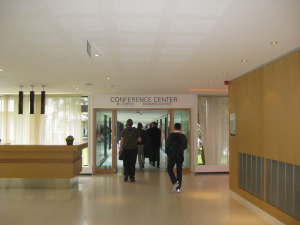
– Community Roundtable –
In addition to being a general overview of the upcoming day, this roundtable really focused on the perception the community in general has of Canonical. In this last cycle the Canonical Design team really came under fire for making design decisions without keeping the community up to speed on the moving of window control buttons, and the now infamous bug report related to it. The rationale for this eventually came out in Mark’s blog and is generally supported by the community but it was felt that much of the community uproar could have been prevented by having some of the design team’s work be more accessible to the community. In response to this the Design Team over at Canonical have launched a really great blog over at design.canonical.com to work harder to engage the community and keep them up to speed with their ideas and projects. The design team was not the only team focused on in this discussion, it also expanded to other roles within Canonical, including those of developers. It turns out that it’s not well-know that for a Canonical employee to become an Ubuntu developer (or even an Ubuntu member) they need to go through the same process as anyone in the community seeking to fill the same roles, and indeed, there have been times when Canonical employees were asked to reapply for positions within the community when the governing membership boards felt they didn’t have enough solid involvement. The result of this session? Communication has to improve on all fronts to keep the relationship between the Ubuntu community and Canonical a healthy one.
– Ubuntu NGO Team plans for Maverick –
This was probably the most productive session of the day for me. The NGO Team has some really great folks involved who are really inspired to reach out to more non-profits and get them the help they need with documents, software packages and general tips for using Ubuntu and other open source applications within their organization. The result of this was several tasks defined for this next cycle, including some for me regarding php pear packages required for some of the webapps that the NGOs are keen to use.
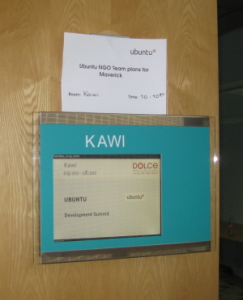
– Ubuntu Support and Learning Center –
In this session Benjamin Humphrey introduced ideas for a Support and Learning Center website. The rationale behind this is outlined in the introductory paragraph of their wiki page:
The Ubuntu Support and Learning Center (USLC) will be an awesome, quality, dynamic website that acts as an online learning and support center for Ubuntu users to both solve their problems or work through tasks, and also to learn more about Ubuntu and how to contribute to it. The final site would involve material from the manual project, docs team, learning project and third party articles, split into well organized, topic based help using cutting edge web technologies like HTML5. The website would also collect information and feedback from the users on the usefulness of articles or individual paragraphs, so that we can constantly improve our material to make it the best quality we can.
It is primarily a portal for content that is easily accessible to users. Much of the discussion on this centered around making sure the team was going to work with the existing teams to develop content, and the hope is that initially this really would be a portal to existing content instead of a lot of content developed by the team itself. However, the grand vision was that of a moderated wiki where contributors would have an interface for quick edits to content that could be submitted via the web interface into the bug tracking system, as well as a full translations system that would be easy to use. As with many documentation initiatives lately the focus is really on working toward high quality documentation while maintaining a low barrier to entry and making translations as easy as possible. Just like the manual project I really hope to see some of the tools used in this project used throughout the community.
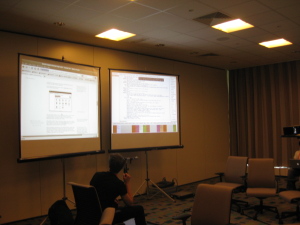
– Development Workflow Overview –
This was the second such session of the week (I didn’t attend the first), and focused mostly on how upstream developers and others could most effectively submit patches, including starting from a base of “how would a developer know where to begin?” and discussing whether attaching patches to bugs really is the most effective strategy. There are currently over a thousand bug reports in launchpad against Ubuntu projects which have patches haven’t been thoroughly reviewed and applied, so while the review team is now working hard to get through this backlog (and doing an amazing job!) the session was seeking to make this job easier by defining a set of simple steps that could be completed in bzr itself so that a patch and merge request could be made directly, hopefully moving the patch that much further along in the development workflow. The patch discussion will continue in some patch-focused sessions later this week.
– Open Week and Developer Week –
I really enjoyed this session a lot. Focused on Classroom events (Open Week, Developer Week, Opportunistic Developer Week, User Days), and general sessions), this session covered some of the strengths and weaknesses and best practices for all these. We also discussed timing of these events and how we can do a better job at promotion, as it was agreed that we could have done better for this latest Open Week and at getting our news out to non-techies in general. Out of this session I’ll also be modifying the Classroom docs somewhat to make it clear that anyone with a project within the community is welcome to use the channel, get their events added to the calendar and take advantage of the features of ClassBot.
– Create a localized help.ubuntu.com –
I don’t know a lot about translations (easy when you only speak one language, and that language is English!) but I do understand their vital importance to a project like Ubuntu, and see the value they present when proprietary and closed source software alternatives lack the international support that open source can provide. The translations of official help docs is an ongoing project that allows for documentation with each release to be shipped with installs, but the help on actual help.ubuntu.com is only published in English. Currently it’s the job of loco teams to maintain their own (like help.ubuntu-it.org) and Matthew East brings up some interesting points about the challenges of maintaining translations sites in his email to the docs list on Sunday. It was an interesting discussion, diving in to the resources the locos have and whether they should really be responsible for handling publishing localized documentation. Since I’m not involved with translations I don’t see myself being involved in this discussion after UDS, but I am certainly going to follow it as it develops.
– Live IRC Support In Apps –
This session covered a proposal (and live implementation with an app written in Python) for a “live help” client for the desktop which has an IRC back end. The initial stab at implementation is clever but probably won’t end up being workable because of the constraints of the IRC medium, since it creates a whole new channel for each support request, an idea which probably won’t scale (and might upset freenode). I was also somewhat concerned about handling quality of support, citing that when people use an app from their desktop itself they tend to think the person on the other end is a professional, but my doubts were mostly laid to rest when the discussion went in the direction of making it clear that it was free, community support, and perhaps they’d even add a link to paid support options. A very interesting session in all, it’s always exciting to see how people are innovating to improve the user experience.
Once sessions wrapped up several of us decided to take one of the evening buses in to Waterloo for dinner. It was raining so not the most beautiful night in town, but we were able to find a charming little restaurant, Restaurant L’Amusoir. Only a couple folks really knew French, so we were dependent upon them (this is steak with frites, right?) but it actually wasn’t too difficult, and the waiter helpfully knew enough english so that we were able to get by. So we ordered a round of beers and some amazing steaks.
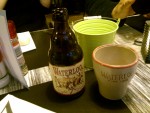
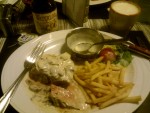
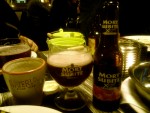
First up was the Waterloo Triple 7 Blond, which was really nicely balanced, if a bit strong for a first beer of the evening. Then it was on to the Mort Subite, a lambic made by Alken-Maes Brewery. I ended up with a Kriek (in spite of the photo above being of a bottle of Framboise, the glass itself has Kriek!), which was quite sweet. Dinner itself was a generous portion of steak with creamy mushroom sauce, salad and frites, and was nothing short of spectacular, if a bit filling!
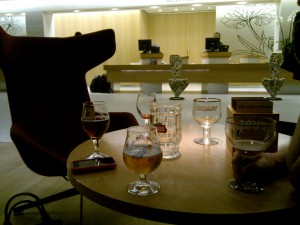
Around 10PM we caught the bus back to the hotel and settled down in the hotel bar where I picked up a Delirium Tremens. Now, Delirium Tremens is one of my favorite beers in the world, and it isn’t particularly hard to find in the US, but all of the beers server here at the hotel are familiar so I figured I might as well go with a favorite since new wasn’t an option. I ended up having some great chats about beer with Jan Claeys, continuing the dozens we’d had online previously, it was really a pleasure to be able to finally enjoy some beers and talk in person. I headed to bed shortly after midnight.
Now off to start day 3! Tonight Ubuntu Women is having a team dinner down at Drug Opera Restaurant, if you’re at UDS and reading this and would like to join us (no, you don’t have to be a woman, just be supportive), check out the signup section on the LocalParticipation page so we can get an accurate count for our reservations. Afterwards we’ll be heading over to the famous Delirium Cafe.


Wednesday, May 12th, 2010 at 7:23
Hi. If you’ll find the baladen’s beers (super, erika, nora) try it.
http://www.baladin.it/
Or the Troll’s Beers
http://www.birratroll.it/le_birre.htm
These beers are the non plus ultra italian beer. You can find in every parts of the world.
kisssss
Dony